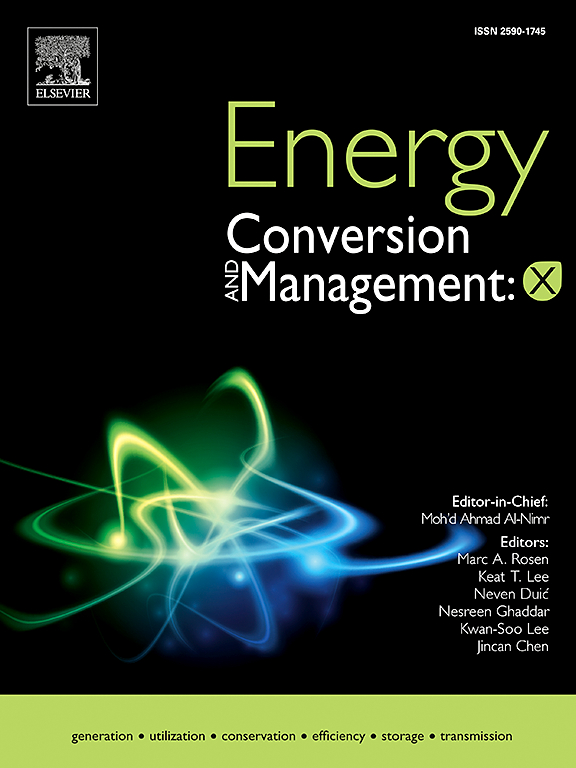利用改进的数据驱动模型预测控制的高科技温室高效能源管理和温度控制
IF 7.1
Q1 ENERGY & FUELS
引用次数: 0
摘要
干旱气候下的温室需要先进的控制系统来维持小气候,减少能源利用,确保经济可行性。为了应对这些挑战,模型预测控制是一种有效的方法,它可以预测系统的未来状态并相应地调整控制变量。然而,确定性模型预测控制没有考虑系统的不确定性,导致性能下降。因此,本研究提出了一种改进的模型预测控制框架,该框架利用历史温室数据开发的人工神经网络。该方法采用双层方法,其中主控制器提供标称轨迹,辅助控制器调整不确定性。对双层预测控制框架在不同条件下的温度控制性能和能量利用性能进行了评估。结果表明,尽管系统存在不确定性,双层模型预测控制框架仍优于现有的温室气候系统确定性和鲁棒模型预测控制方法。冬季和夏季的平均绝对误差分别为0.09°C和0.10°C,均方根误差分别为0.19°C和0.36°C。在4 d的仿真期内,与现有控制系统相比,双层模型预测控制方法在冬季和夏季分别降低了20.01%和13.34%的能源利用率。本文章由计算机程序翻译,如有差异,请以英文原文为准。

Efficient energy management and temperature control of a high-tech greenhouse using an improved data-driven model predictive control
Greenhouses in arid climates require advanced control systems to maintain the microclimate and reduce energy utilization, ensuring economic viability. To address these challenges, model predictive control is an effective method that forecasts the system’s future state and adjusts control variables accordingly. However, deterministic model predictive control does not account for system uncertainties, leading to performance degradation. Therefore, this study proposes an improved model predictive control framework that utilizes an artificial neural network developed from historical greenhouse data. This method uses a double layer approach, where the primary controller provides the nominal trajectory, and an ancillary controller adjusts for uncertainties. The double layer predictive control framework was assessed under varying conditions to evaluate the performance in terms of temperature control and energy utilization. Results illustrated that, despite system uncertainties, the double layer model predictive control framework outperformed the existing greenhouse climate system, deterministic and robust model predictive control approaches. It demonstrated mean absolute errors of 0.09 °C in winter and 0.10 °C in summer, with corresponding root mean squared errors of 0.19 °C and 0.36 °C, respectively. Moreover, the double layer model predictive control method reduced energy utilization by 20.01 % in winter and 13.34 % in summer compared to the existing control system over a 4 d simulation period.
求助全文
通过发布文献求助,成功后即可免费获取论文全文。
去求助
来源期刊

Energy Conversion and Management-X
Multiple-
CiteScore
8.80
自引率
3.20%
发文量
180
审稿时长
58 days
期刊介绍:
Energy Conversion and Management: X is the open access extension of the reputable journal Energy Conversion and Management, serving as a platform for interdisciplinary research on a wide array of critical energy subjects. The journal is dedicated to publishing original contributions and in-depth technical review articles that present groundbreaking research on topics spanning energy generation, utilization, conversion, storage, transmission, conservation, management, and sustainability.
The scope of Energy Conversion and Management: X encompasses various forms of energy, including mechanical, thermal, nuclear, chemical, electromagnetic, magnetic, and electric energy. It addresses all known energy resources, highlighting both conventional sources like fossil fuels and nuclear power, as well as renewable resources such as solar, biomass, hydro, wind, geothermal, and ocean energy.
 求助内容:
求助内容: 应助结果提醒方式:
应助结果提醒方式:


